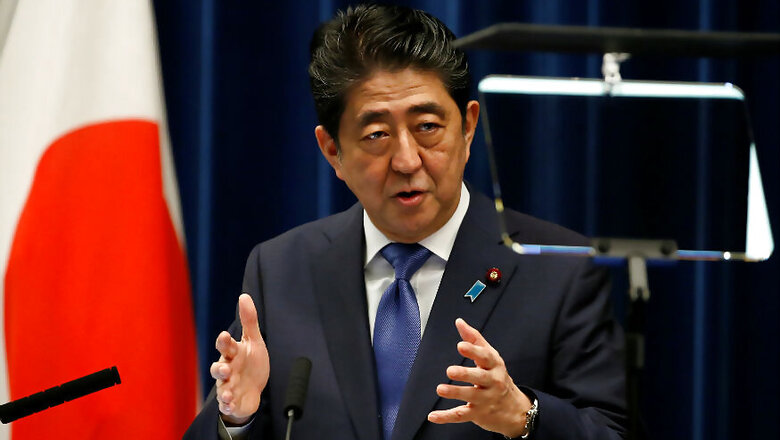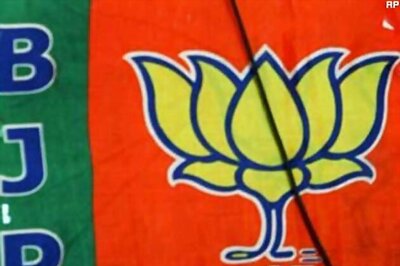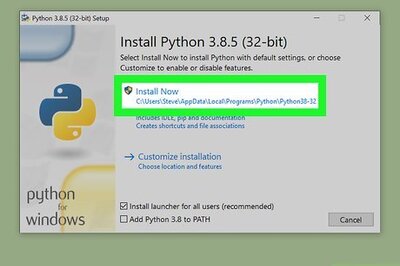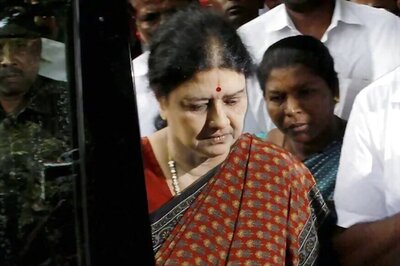
views
Tokyo: Japanese Prime Minister Shinzo Abe, who has called a snap election, first came to power in 2006-2007. He returned as prime minister in 2012, a rare comeback in Japanese politics.
Here are five key events that have defined Abe's career.
Blue blood, bad bowels
Abe is a third-generation politician groomed from birth for the job by his elite, conservative family. His grandfather served as prime minister and his father as foreign minister.
He took his father's seat as an MP in 1993 and, after a stint as chief cabinet secretary, became the country's youngest post-war prime minister in 2006 at the age of 52.
But his term was abruptly cut short after only a year when he stepped down citing bowel problems caused by extreme exhaustion and stress.
He later gave a somewhat overly detailed explanation of the effects of ulcerative colitis, which involved toilet visits he said were too frequent to be compatible with one of the great offices of state.
Comeback kid
Abe got a rare second chance in December 2012 as a disillusioned public dumped a three-year experiment with the left-leaning Democratic Party of Japan.
The DPJ's promise to remake the country after more than half a century of almost unbroken rule by Abe's Liberal Democratic Party disappeared under a wave of scandal and ineptitude.
Abe was also able to capitalise on the DPJ's failure to tackle the atomic accident at the Fukushima Daiichi power plant, the world's worst since Chernobyl in 1986.
A 9.0-magnitude earthquake in March 2011 triggered a massive and deadly tsunami, which smashed into the power station and overwhelmed the reactor's cooling systems, sending three into meltdown.
However, Abe has steadily promoted nuclear energy, calling it essential to powering the world's third-largest economy.
Abe and utility companies have been pushing to switch back on nuclear reactors shut down after the Fukushima crisis to review safety.
Abenomics
Abe swept back to power on a pledge to reignite Japan's once-booming economy with a plan dubbed Abenomics.
The scheme — a mix of huge monetary easing, government spending and reforms to the economy — stoked a stock market rally and fattened corporate profits.
Japan has posted its longest economic expansion in over a decade, but inflation is far below the BoJ's target, discouraging spending by consumers.
The country has been struggling to defeat years of deflation and slow growth that followed the collapse of an equity and property market bubble in the early nineties.
Pacifism?
Throughout Abe's career, he has strived to revise Japan's pacifist constitution, imposed on the defeated country by the United States in 1947, seven years before he was born.
Abe is a staunch supporter of the security relationship with the US but he has long called for revising the constitution, seen by conservatives as an outdated legacy of the country's wartime defeat and occupation.
Japan in 2015 passed controversial new laws that could, under certain circumstances, see its troops fight abroad for the first time since the end of World War II.
Abe says the legislation is necessary because of perceived threats from an increasingly assertive China and an unstable North Korea.
Opponents argue they go against both the constitution and the national psyche, and could see Japan dragged into wars led by treaty ally the US.
North Korea
Abe made his name by taking a tough line on North Korea, especially over the rogue state's kidnapping of Japanese nationals to train its spies.
And North Korea has shot back to the top of the agenda in Japan following two ballistic missile launches over the country that the nationalist Abe has firmly condemned.
Some experts say the North's provocative acts have helped boost Abe's public support and prompt him to call the snap election.




















Comments
0 comment